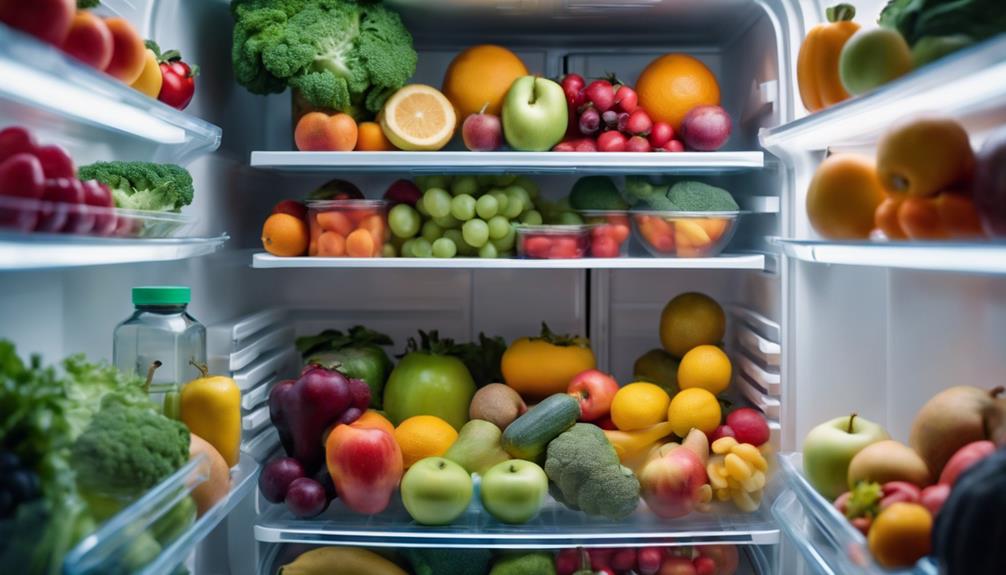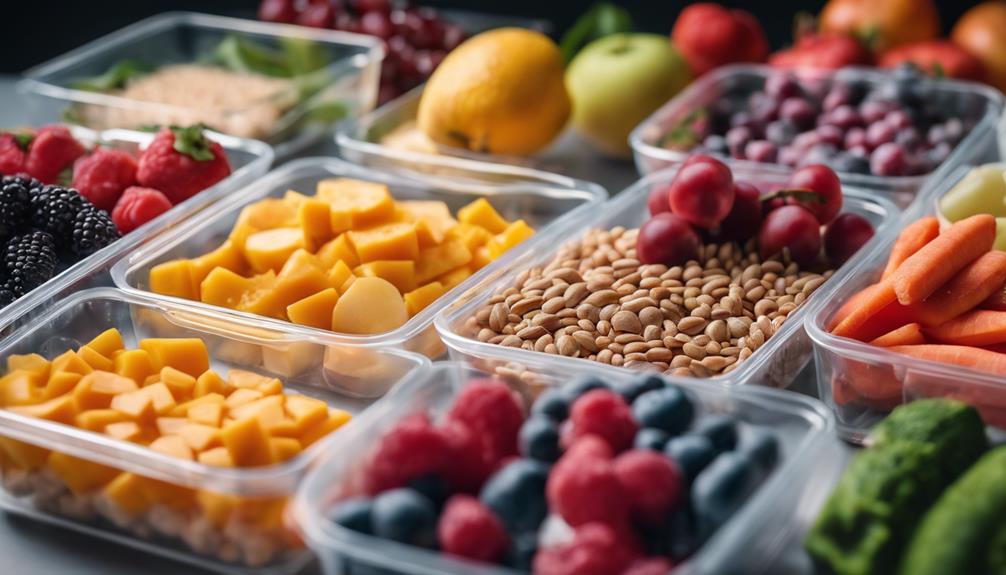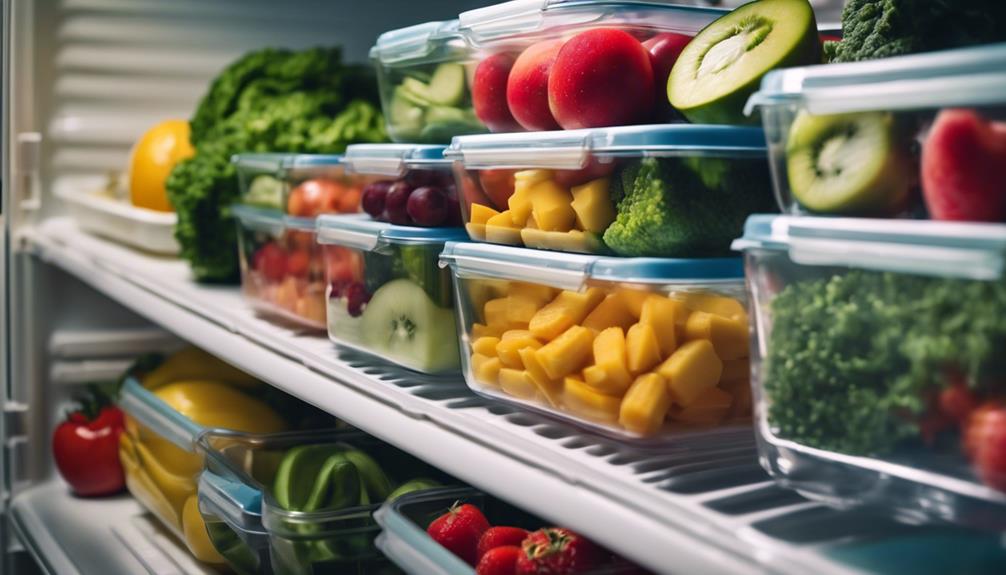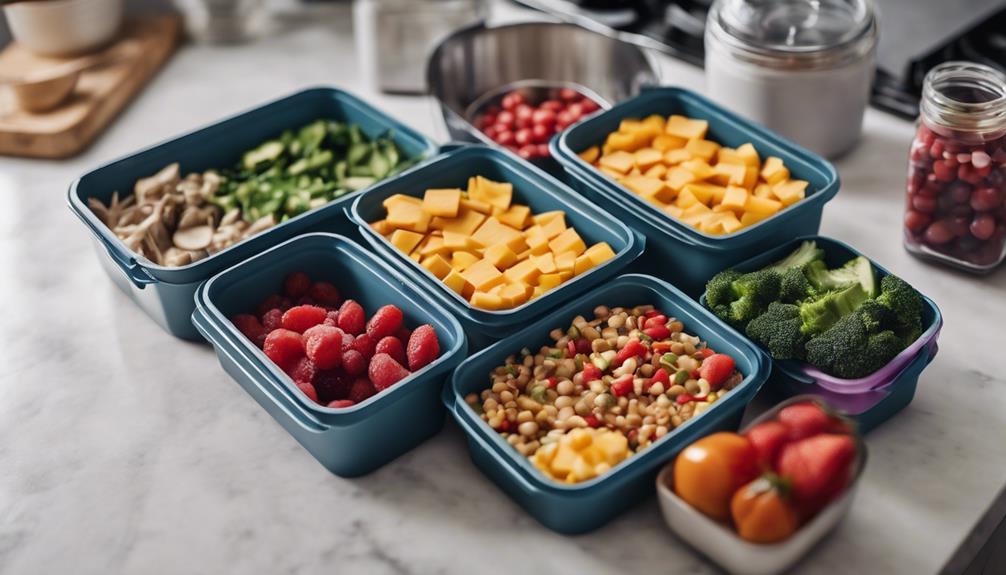The Advantages of Meal Planning for Weight Loss
You've probably heard the saying, 'Failing to plan is planning to fail,' and when it comes to weight loss, meal planning can be a game-changer. Imagine effortlessly making healthier food choices, managing portion sizes effectively, and ensuring your body gets all the necessary nutrients it needs.
But the benefits of meal planning for weight loss go beyond just what's on your plate. Stay tuned to discover how this simple habit can transform not just your diet but your entire approach to a healthier lifestyle.
Key Takeaways
- Meal planning aids weight loss by promoting healthier food choices and portion control.
- It saves time, money, and reduces stress from impulsive eating decisions.
- Supports consistent eating habits, boosts metabolism, and enhances overall health.
- Enhances culinary skills, fosters organization, and empowers individuals towards sustainable weight loss goals.
Healthier Food Choices
Making healthier food choices is a key component of successful weight loss, and meal planning can help you achieve this goal effectively. When it comes to meal prep, having a plan in place can guide you towards selecting nutritious options and avoiding last-minute unhealthy choices. By dedicating time for grocery shopping with a list of ingredients needed for your planned meals, you're more likely to stick to your weight loss goals.
During grocery shopping, focus on purchasing fresh fruits, vegetables, lean proteins, whole grains, and low-fat dairy products. Avoid aisles that are filled with processed and sugary foods that may derail your progress. Planning your meals in advance not only ensures that you have healthier options readily available but also prevents impulse purchases of unhealthy snacks.
Portion Control
To effectively manage your caloric intake and support your weight loss journey, mastering portion control is crucial. Portion control involves being mindful of the amount of food you consume to ensure you aren't overeating. By paying attention to portion sizes, you can better regulate your calorie intake and prevent unnecessary weight gain.
Here are some key points to consider:
- Mindful eating: Being present and aware of your eating habits can help you make better food choices and control portion sizes effectively.
- Satiety signals: Listen to your body's cues of fullness to avoid overeating. Eating slowly and giving your body time to register satiety can prevent consuming excess calories.
- Plate size matters: Opt for smaller plates to visually trick your mind into thinking you're eating more, which can help control portion sizes.
- Avoid distractions: Focus on your meal without distractions like TV or phones, as this can lead to mindless overeating.
- Practice portion control: Use measuring cups, scales, or visual cues to learn appropriate portion sizes for different food groups.
Mastering portion control through mindful eating and understanding satiety signals can be transformative in managing your weight effectively.
Balanced Nutrients
Ensure your weight loss journey is supported by consuming a balanced mix of essential nutrients to optimize your health and achieve your goals. Nutrient tracking is a key component of meal planning for weight loss. By being mindful of the nutrients you're consuming, you can ensure that you're meeting your body's needs while staying within your calorie goals. Tracking nutrients such as proteins, carbohydrates, fats, vitamins, and minerals can help you make informed decisions about your meals.
Incorporating meal variety is essential for ensuring you're receiving a wide range of nutrients. Different foods contain different combinations of nutrients, so by varying your food choices, you can cover all your nutritional bases. Aim to include a variety of fruits, vegetables, whole grains, lean proteins, and healthy fats in your meal plan. This not only keeps your meals interesting but also helps prevent nutrient deficiencies.
Weight Loss Support
For effective weight loss, having a solid support system in place can significantly boost your chances of success. Finding the right support can make your weight loss journey more manageable and enjoyable. Here are some ways in which you can seek support for your weight loss goals:
- Group Accountability: Joining a weight loss group or partnering with friends who share similar goals can provide you with the accountability and motivation needed to stay on track.
- Meal Prep: Engaging in meal prep sessions with friends or family members can make the process more fun and efficient, ensuring that you have healthy meals readily available.
- Online Communities: Participating in online weight loss communities can offer a sense of belonging, encouragement, and valuable insights from others going through similar experiences.
- Recipe Sharing: Sharing healthy recipes with your support system can introduce variety into your meal plan and keep you inspired to try new, nutritious foods.
- Workout Buddies: Partnering up with a workout buddy can make exercising more enjoyable and help you stay committed to your fitness routine.
Building a strong support system that aligns with your weight loss goals can provide the encouragement and accountability needed to achieve sustainable results.
Time-saving
When it comes to weight loss support, one essential aspect that can enhance your journey is the time-saving benefits of efficient meal planning. By dedicating some time each week to plan your meals and snacks, you can save a significant amount of time during the busy weekdays. Meal prepping allows you to have ready-to-eat healthy options, reducing the need for last-minute cooking or unhealthy takeout choices. Additionally, efficient grocery shopping based on your meal plan helps you save time wandering around the store and prevents impulse purchases. Below is a quick comparison of time spent on meal prep and grocery shopping before and after incorporating meal planning into your routine:
| Activity | Without Meal Planning | With Meal Planning |
|---|---|---|
| Meal Prep | 60 minutes per day | 120 minutes per week |
| Grocery Shopping | 45 minutes 3 times a week | 60 minutes once a week |
Implementing meal planning not only supports your weight loss goals but also liberates your time for other activities you enjoy.
Cost-effective
To maximize your budget while pursuing your weight loss goals, consider the cost-effective advantages of incorporating meal planning into your routine. Meal planning can be a game-changer when it comes to saving money while trying to eat healthily. Here are some ways in which meal planning can help you achieve your weight loss goals without breaking the bank:
- Budget-friendly meals: By planning your meals ahead of time, you can choose cost-effective ingredients and avoid expensive last-minute purchases.
- Meal prep: Spending some time prepping your meals for the week can save you money by preventing impulse buys or dining out.
- Grocery savings: With a well-thought-out meal plan, you can make a detailed grocery list and stick to it, avoiding unnecessary spending.
- Meal plans: Following a meal plan helps you avoid buying unnecessary items at the store and reduces the temptation of eating out.
- Cost-efficient ingredients: Planning your meals allows you to buy in bulk, take advantage of sales, and use ingredients across multiple dishes, ultimately saving you money.
Reduced Food Waste
Maximizing your meal planning efforts can't only help you save money but also significantly contribute to reducing food waste. By carefully planning your meals, you can ensure that you only purchase what you need, leading to less unused food being thrown away. This reduction in food waste not only benefits your wallet but also has a positive environmental impact.
Meal prep plays a crucial role in reducing food waste. When you plan your meals in advance, you can buy ingredients in the right quantities, avoiding overbuying perishable items that may end up spoiling before you can use them. Effective time management in meal planning allows you to utilize ingredients efficiently, incorporating leftovers into future meals and ensuring that nothing goes to waste.
Incorporating sustainability practices into your meal planning routine not only supports your weight loss goals but also contributes to a greener planet. By being mindful of the environmental impact of food waste and implementing strategies to reduce it, you can make a positive difference while enjoying the benefits of organized meal planning.
Stress Reduction
Embracing a structured meal planning approach can lead to a notable reduction in stress levels as you navigate your weight loss journey. When you plan your meals ahead of time, you eliminate the daily stress of deciding what to eat, allowing you to focus more on your weight loss goals.
Here's how meal planning can help reduce stress:
- Mindful Eating: Meal planning encourages you to be more mindful of what you eat, promoting a healthier relationship with food and reducing stress-related emotional eating.
- Daily Routines: Establishing a meal planning routine can provide a sense of structure and predictability to your day, reducing decision fatigue and stress.
- Time Management: By allocating specific times for meal prep and planning, you can free up time during the week, reducing the stress of last-minute cooking or unhealthy food choices.
- Mental Health: Planning balanced meals can positively impact your mental well-being, reducing anxiety and stress levels associated with poor dietary choices.
- Stress Reduction: Overall, meal planning can alleviate the stress of making spontaneous, potentially unhealthy food decisions, leading to a more relaxed approach to weight loss.
Increased Cooking Skills
Enhancing your culinary abilities through meal planning can empower you to develop increased cooking skills essential for achieving your weight loss objectives. By consistently preparing meals at home as part of your meal planning routine, you have the opportunity to experiment with new ingredients, cooking methods, and recipes. This hands-on experience in the kitchen allows you to hone your cooking techniques and expand your culinary knowledge.
As you engage in meal planning, you'll likely discover improved techniques that save time and enhance the flavor of your meals. Whether it's mastering the art of meal prepping for the week ahead or learning how to properly season dishes for maximum taste without relying on excessive fats or sugars, your cooking skills will continue to evolve.
Furthermore, as you become more adept in the kitchen through meal planning, your culinary confidence will grow. You'll feel more comfortable trying new recipes, adapting dishes to suit your dietary preferences, and making healthier choices overall. This newfound confidence in your cooking abilities won't only support your weight loss journey but also empower you to enjoy the process of preparing nutritious meals.
Improved Organization
As you refine your cooking skills through meal planning, you naturally develop a heightened sense of organization that streamlines your approach to preparing and enjoying meals. This newfound organizational prowess extends beyond the kitchen, seeping into various aspects of your daily routine. Embracing meal planning fosters a structured mindset that enhances efficiency and effectiveness in managing your nutrition.
Here are some ways in which improved organization can benefit you:
- Efficient Meal Prep: Organizing your meals in advance allows you to streamline the cooking process, saving time and reducing stress during busy weekdays.
- Effective Grocery Shopping: With a clear plan in hand, grocery shopping becomes a targeted mission, avoiding unnecessary purchases and ensuring you have all the ingredients you need for your planned meals.
- Reduced Food Waste: Planning meals helps you buy only what you need, minimizing the chances of ingredients going bad before use.
- Healthier Choices: Organized meal planning encourages mindful food choices, promoting a balanced and nutritious diet.
- Time Management: By having a set plan, you free up mental space and time for other activities, fostering a more balanced lifestyle.
Consistent Eating Habits
Developing consistent eating habits is crucial for maintaining a balanced and healthy diet. Mindful eating and tracking your nutrition intake are essential components of fostering these habits. By being aware of what you eat and how much you consume, you can make informed choices that align with your weight loss goals. Mindful eating involves paying attention to your food, savoring each bite, and recognizing when you're full, which can prevent overeating and promote better digestion.
Incorporating a variety of foods into your meals is another key aspect of consistent eating habits. This ensures that you receive a wide range of nutrients necessary for overall health and weight management. Meal prepping techniques can help you stick to your plan by having healthy meals readily available, reducing the temptation to opt for less nutritious options when pressed for time. Planning your meals in advance also allows you to control portion sizes and monitor your caloric intake, contributing to your weight loss journey.
Enhanced Energy Levels
How can meal planning contribute to boosting your energy levels for optimal weight loss progress?
Meal planning plays a crucial role in enhancing your energy levels by providing your body with the necessary nutrients at the right times. By fueling your body effectively, you can experience improved focus throughout the day and better sleep at night, both of which are essential for overall well-being and weight loss success.
- Improved Focus: Consistent and balanced meals help regulate blood sugar levels, preventing energy crashes that can affect your concentration.
- Better Sleep: A well-planned diet can promote better sleep quality, allowing your body to rest and recover adequately.
- Increased Metabolism: Eating nutritious meals at regular intervals can boost your metabolism, helping you burn calories more efficiently.
- Reduced Cravings: By having nutritious meals readily available, you can reduce cravings for unhealthy snacks that provide temporary energy spikes.
- Sustained Energy: Proper meal planning ensures a steady supply of energy throughout the day, keeping you feeling energized and focused.
Frequently Asked Questions
How Can Meal Planning Help With Overcoming Food Cravings and Emotional Eating?
Meal planning can aid in overcoming food cravings and emotional eating by promoting mindful eating and stress management. It helps with portion control, ensuring balanced meals that satisfy your hunger and nourish your body effectively.
Can Meal Planning Be Customized for Specific Dietary Restrictions or Preferences, Such as Gluten-Free or Vegetarian Diets?
Looking to accommodate dietary restrictions or preferences? Meal planning offers flexibility with allergen-friendly options and plant-based alternatives. You can customize your meals to suit your needs, making healthy eating tailored and enjoyable.
Are There Any Resources or Tools Available to Help With Meal Planning, Such as Apps or Websites?
Looking to streamline meal planning? Meal planning apps offer convenience with personalized features. Online recipe resources provide endless inspiration and tailored options. Embrace these tools to simplify your journey towards healthier eating habits.
How Can Meal Planning Be Adapted for Busy Schedules or Unpredictable Work Hours?
When adapting meal planning for busy schedules or unpredictable work hours, consider quick options like prepping overnight oats or smoothie packs. Utilize recipe ideas for on-the-go solutions. Efficient time management is key to sustaining healthy eating habits.
Are There Any Tips for Incorporating Variety and Diversity Into Meal Plans to Prevent Boredom or Monotony?
To keep meal plans exciting, try mixing up flavor combinations and seeking recipe inspiration from diverse cuisines. Experiment with ingredient swaps for healthier options and explore cultural fusion dishes to add variety and prevent monotony in your meals.
Conclusion
In conclusion, meal planning offers numerous benefits for weight loss. By making healthier food choices, controlling portions, and ensuring balanced nutrients, you're setting yourself up for success.
With the added support for weight loss, time-saving benefits, and improved cooking skills, meal planning can enhance organization and consistency in your eating habits.
So, why not give meal planning a try and see the positive impact it can have on your weight loss journey?













